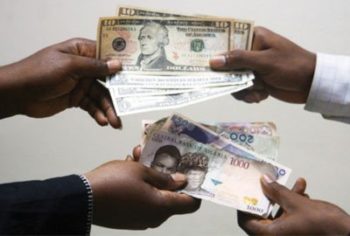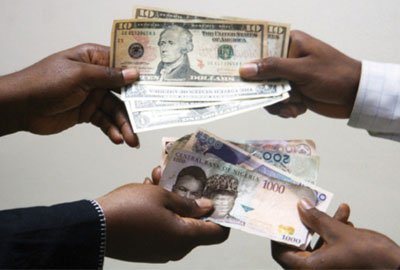
The Association of Bureaux De Change Operators of Nigeria (ABCON) has advised the Central Bank of Nigeria (CBN) on steps to sustain the naira’s recovery against dollar. The naira has remained at N362/$1 at the parallel market in the last one week, a major improvement from N520/$1 in February.
In a statement released yesterday, ABCON President Aminu Gwadade said the CBN should review BDCs dollar buying rate downwards from N360 to N350/$1 and enhance security surveillance at the borders to checkmate illegal cash movement that has dire consequences on naira’s stability.
Gwadabe said the standard/average trade margin for BDCs across the world is 12 per cent and reviewing the rate to N350/$1 is less than three per cent for Nigerian operators.
”The CBN should be proactive enough to quickly review the BDC buying rate so as to bring the foreign exchange transfer rate down and boost market stability. The BDC rate should be brought down to N350/$1 for now and see the positive impact on the local currency,” he said.
Gwadabe said the rate challenges faced by BDCs, if not checked, would trigger a liquidity crisis that may derail the ongoing recovery of the naira against the dollar. He said the BDCs will continue to support CBN’s determination to achieve exchange rate stability, and strengthen the value of the local currency.
He said downward review of the BDCs rate is critical at present, as it will keep BDCs afloat to meet increasing forex demand at the retail end of the market. “For now, the parallel market operators are taking over our business because BDCs rates and their selling rates are the same and this has to change,” he said.
He also called on the CBN to increase the volume of Personal Travel Allowances (PTAs) from $4,000 to $8,000; Business Travel Allowances (BTAs) from $5,000 to $10,000; school fees from $5,000 to $20,000 and medicals from $5,000 to $15,000 quarterly to deepen liquidity in the market.
Gwadade, said implementing these recommendations will help to stop a new wave of volatility building up in the forex market over parallel market/BDCs rate convergence. Both the parallel market and BDCs rate are trading around N360/$1, and the BDCs buy the International Money Transfer Operators (IMTOs) proceeds from the CBN at N360/$1.
He disclosed that with forex transfer rate at N375/$1, which is N15 higher than N360/$1 cash rate, rent seekers are mopping up dollars and moving them to Dubai, China and Lebanon from where they transfer them back to the country and make huge margins.
Gwadabe praised the CBN for liberalizing the forex market and making more dollars available, but regretted that such funds are not really accessible in right volumes to the critical stakeholders like BDCs adding that increasing the volume of PTAs, BTAs, school fess and medicals will help to make more funds available to end users.
“We are happy that the CBN is liberalising the foreign exchange market to ensure that its objective of deepening the market is achieved. We applaud its decision of allowing authorized dealers in interbank trading to release excess foreign exchange trading positions to other authorised dealers without seeking prior approval from the CBN,” he said.
Gwadabe also said the coming of Investors and Exporters (I&E) Forex Window, was also part of CBN’s efforts to further develop the Nigerian forex market and improve market structure.
Part of the liberalization policy, he added, is the directive that all interbank trades, spot, forwards, futures, options and swaps that impact on authorized dealers limit comply with rate reasonability standards. Besides, the CBN reserves the right to intervene as a buyer or seller as it deems fit on the interbank market.
He reiterated that the forex liberalization policy has created more liquidity in the market, except that such funds are not accessible in the right proportions to key stakeholders.
“What stops the CBN from raising the PTA and BTA to $8,000 and $10,000 per quarter? The school fees and medicals should also be increased to $20,000 and $15,000 respectively to put more dollars in the hands of end-users. That way, the liquidity that is coming from liberalization of the forex market will be absorbed,” he said.
The ABCON boss believes that despite the challenges facing the economy, the CBN and BDCs should continue to brainstorm and find sustainable solutions that can help the country wriggle out of the ongoing forex crisis and achieve full economic recovery.
He also pledged to ensure that purchased funds by its members are disbursed to end users and for eligible transactions only; operators will continue to render weekly returns on dollar purchases to the CBN while those that breach regulatory guidelines are sanctioned.

